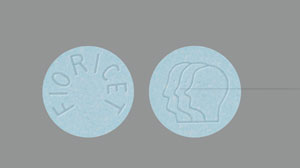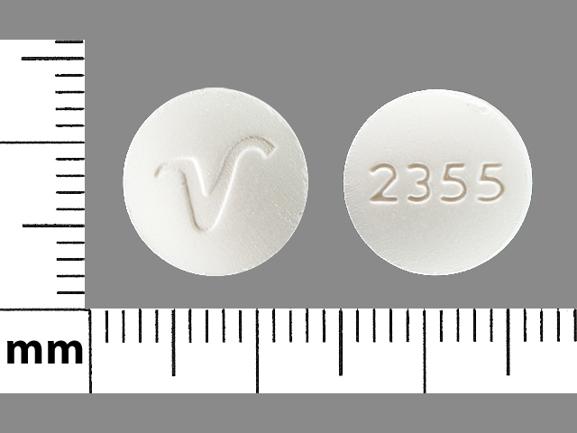Fioricet Commonly used brand name(s)
In the U.S.
-
- Anolor 300
- Dolgic LQ
- Esgic
- Esgic-Plus
- Ezol
- Fioricet
- Geone
- Margesic
- Medigesic
- Nonbac
- Pacaps
- Repan
Available Dosage Forms:
-
- Tablet
- Capsule
- Solution
Therapeutic Class: Butalbital/Acetaminophen Combination
Pharmacologic Class: Barbiturate
Chemical Class: Methylxanthine
Uses for Fioricet
Butalbital, acetaminophen, and caffeine combination is used to relieve symptoms of tension (or muscle contraction) headaches.
Butalbital belongs to the group of medicines called barbiturates. Barbiturates act in the central nervous system (CNS) to produce their effects.

Acetaminophen is used to relieve pain and reduce fever in patients. It does not become habit-forming when taken for a long time. But acetaminophen may cause other unwanted effects when taken in large doses, including liver damage.
When butalbital is used for a long time, it may become habit-forming, causing mental or physical dependence. However, people who have continuing pain should not let the fear of dependence keep them from using narcotics to relieve their pain. Physical dependence may lead to withdrawal side effects if treatment is stopped suddenly. However, severe withdrawal side effects can usually be prevented by gradually reducing the dose over a period of time before treatment is stopped completely.
Caffeine is a CNS stimulant that is used with pain relievers to increase their effect. It has also been used for migraine headaches. However, caffeine can also cause physical dependence when it is used for a long time. This may lead to withdrawal (rebound) headaches when you stop taking it.
This medicine is available only with your doctor’s prescription.

What You Should Know Before You Take Fioricet ?
Do not use Fioricet if you have taken an MAO inhibitor in the past 14 days. A dangerous drug interaction could occur. MAO inhibitors include isocarboxazid, linezolid, phenelzine, rasagiline, selegiline, and tranylcypromine.

You should not use Fioricet if you are allergic to acetaminophen, butalbital, or caffeine, if you have porphyria, or if you have recently used alcohol, sedatives, tranquilizers, or other narcotic medications.
To make sure Fioricet is safe for you, tell your doctor if you have:
-
- liver disease, cirrhosis, a history of alcoholism or drug addiction, or if you drink more than 3 alcoholic beverages per day;
- kidney disease;
- asthma, sleep apnea, or other breathing disorder;
- stomach ulcer or bleeding;
- a history of skin rash caused by any medication;
- a history of mental illness or suicidal thoughts; or
- if you use medicine to prevent blood clots.
It is not known whether Fioricet will harm an unborn baby. If you use butalbital while you are pregnant, your baby could become dependent on the drug. This can cause life-threatening withdrawal symptoms in the baby after it is born. Babies born dependent on habit-forming medicine may need medical treatment for several weeks. Tell your doctor if you are pregnant or plan to become pregnant.
This medicine can pass into breast milk and may harm a nursing baby. Tell your doctor if you are breast-feeding a baby.
Is Fioricet Addictive?
Although it’s only a prescription headache medication, Fioricet has the potential to cause addiction. If a person follows their prescription guidelines and uses the medication correctly, the risks of addiction are low. However, if someone takes too much Fioricet, they may develop tolerance to its effects. A person with tolerance to a certain dose of Fioricet will require higher doses of the medication to alleviate their headaches.
A Person Dependent on Fioricet Will Suffer From Withdrawal When Attempting To Stop Taking The Drug.
When a person with tolerance starts to take more Fioricet, possibly by obtaining more prescriptions, they may eventually become dependent on it. In other words, they may feel unable to get through the day without taking Fioricet, and if they stop, they will experience symptoms of withdrawal. These symptoms arise because their body has grown accustomed to Fioricet in high doses.
If a Fioricet-dependent person attempts to weather withdrawal alone, it’s likely they will take Fioricet again just to relieve the symptoms. This is a hallmark characteristic of addiction. Anyone who compulsively abuses Fioricet to avoid withdrawal likely has an addiction to Fioricet.
Additionally, people with an addiction to Fioricet will experience cravings for the medication which further compel them to keeping using it.
Moreover, the ingredient butalbital is an addictive substance in its own right. Butalbital can cause someone to “get high” because it’s a central nervous system depressant. Since butalbital is part of Fioricet, it is possible for someone to abuse Fioricet as a recreational drug. At high doses, Fioricet can intoxicate a person in a manner similar to alcohol. People who abuse Fioricet for this purpose have as much of a risk of developing an addiction as they would have if they repeatedly use an illegal drug.
We really do not suggest you take fioricet for a longer time. You must find a way to relief your pain because fioricet maybe addictive.
Before using Fioricet
In deciding to use a medicine, the risks of taking the medicine must be weighed against the good it will do. This is a decision you and your doctor will make. For this medicine, the following should be considered:
Allergies
Tell your doctor if you have ever had any unusual or allergic reaction to this medicine or any other medicines. Also tell your health care professional if you have any other types of allergies, such as to foods, dyes, preservatives, or animals. For non-prescription products, read the label or package ingredients carefully.
Pediatric
Appropriate studies have not been performed on the relationship of age to the effects of butalbital, acetaminophen, and caffeine combination in children younger than 12 years of age. Safety and efficacy have not been established.
Geriatric
Appropriate studies performed to date have not demonstrated geriatric-specific problems that would limit the usefulness of butalbital, acetaminophen, and caffeine combination in the elderly. However, elderly patients are more likely to have age-related kidney problems, which may require caution and an adjustment in the dose for patients receiving butalbital, acetaminophen, and caffeine combination.
Breastfeeding
There are no adequate studies in women for determining infant risk when using this medication during breastfeeding. Weigh the potential benefits against the potential risks before taking this medication while breastfeeding.
Interactions with medicines
Although certain medicines should not be used together at all, in other cases two different medicines may be used together even if an interaction might occur. In these cases, your doctor may want to change the dose, or other precautions may be necessary. When you are taking this medicine, it is especially important that your healthcare professional know if you are taking any of the medicines listed below. The following interactions have been selected on the basis of their potential significance and are not necessarily all-inclusive.
Using this medicine with any of the following medicines is not recommended. Your doctor may decide not to treat you with this medication or change some of the other medicines you take.
-
- Riociguat
Using this medicine with any of the following medicines is usually not recommended, but may be required in some cases. If both medicines are prescribed together, your doctor may change the dose or how often you use one or both of the medicines.
-
-
- Alfentanil
- Alprazolam
- Amobarbital
- Anisindione
- Aprobarbital
- Butabarbital
- Calcium Oxybate
- Capmatinib
- Carisoprodol
- Chloral Hydrate
- Chlordiazepoxide
- Chlorzoxazone
- Clarithromycin
- Clonazepam
- Clorazepate
- Dantrolene
- Darunavir
- Diazepam
- Dicumarol
- Doxorubicin
- Doxorubicin Hydrochloride Liposome
- Esketamine
- Estazolam
- Ethchlorvynol
- Etonogestrel
- Flunitrazepam
- Flurazepam
- Givosiran
- Halazepam
- Imatinib
- Iobenguane I 131
- Isoniazid
- Ketazolam
- Lorazepam
- Lormetazepam
- Magnesium Oxybate
- Medazepam
- Mephenesin
- Mephobarbital
- Meprobamate
- Metaxalone
- Methocarbamol
- Methohexital
- Midazolam
- Nifedipine
- Nitrazepam
- Oxazepam
- Peginterferon Alfa-2b
- Pentobarbital
- Phenindione
- Phenobarbital
- Phenprocoumon
- Piperaquine
- Pixantrone
- Pneumococcal 13-Valent Vaccine, Diphtheria Conjugate
- Potassium Oxybate
- Prazepam
- Primidone
- Quazepam
- Secobarbital
- Sodium Oxybate
- Temazepam
- Thiopental
- Trazodone
- Triazolam
- Ulipristal
-
Using this medicine with any of the following medicines may cause an increased risk of certain side effects, but using both drugs may be the best treatment for you. If both medicines are prescribed together, your doctor may change the dose or how often you use one or both of the medicines.
-
- Acenocoumarol
- Cannabis
- Carbamazepine
- Fosphenytoin
- Lixisenatide
- Ospemifene
- Phenytoin
- Prednisone
- Warfarin
- Zidovudine
Interactions with food/tobacco/alcohol
Certain medicines should not be used at or around the time of eating food or eating certain types of food since interactions may occur. Using alcohol or tobacco with certain medicines may also cause interactions to occur. The following interactions have been selected on the basis of their potential significance and are not necessarily all-inclusive.
Using this medicine with any of the following is usually not recommended, but may be unavoidable in some cases. If used together, your doctor may change the dose or how often you use this medicine, or give you special instructions about the use of food, alcohol, or tobacco.
-
- Ethanol
- Tobacco
Using this medicine with any of the following may cause an increased risk of certain side effects but may be unavoidable in some cases. If used together, your doctor may change the dose or how often you use this medicine, or give you special instructions about the use of food, alcohol, or tobacco.
-
- Cabbage
- Ethanol
Other medical problems
The presence of other medical problems may affect the use of this medicine. Make sure you tell your doctor if you have any other medical problems, especially:
-
- Alcohol abuse, history of or
- Drug dependence, or history of or
- Weakened physical condition—Use with caution. May increase risk for more serious side effects.
- Kidney disease or
- Liver disease—Use with caution. The effects may be increased because of slower removal of the medicine from the body.
- Porphyria (an enzyme problem)—Should not be used in patients with this condition.
- Stomach problems—Use with caution. May make these conditions worse.